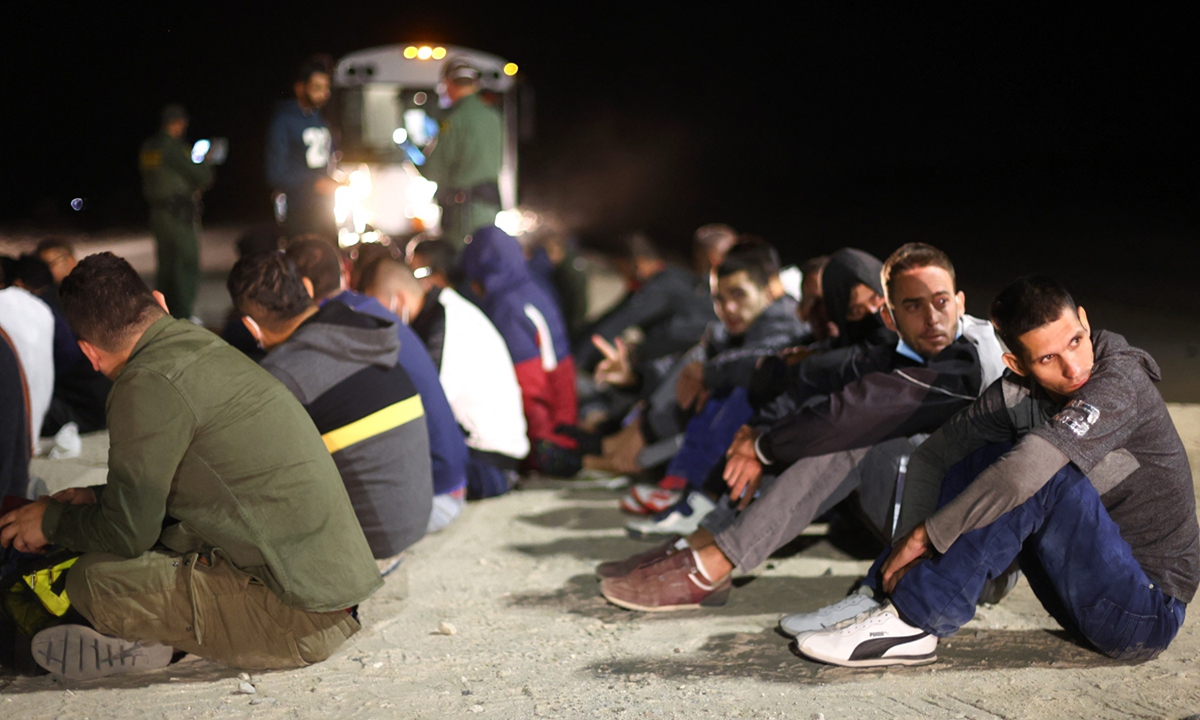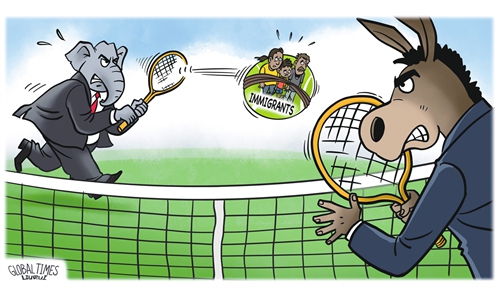
Immigrants wait to board a US Border Patrol bus to be taken for processing after crossing the border from Mexico on May 23, 2022 in Yuma, Arizona. Title 42, the controversial border policy enacted by former US president Donald Trump, which cites COVID-19 as the reason to expel asylum seekers at the US border, was set to expire on May 23. Photo: AFP
The US' pandemic-era border restriction policy known as "Title 42" ended on Thursday. This policy, implemented by the Donald Trump administration, allowed law-enforcement officers to quickly expel illegal migrants at the border in the name of epidemic prevention. In recent days, the country has been seeing a new surge in immigration, with several South Texas counties at the US border having issued disaster declarations. Clearly, the US today is in the midst of two major crises: the federal government's debt ceiling and the capacity to manage incoming of immigrants.There is no doubt that the US is a nation full of immigrants, but the issue of immigration has long been a tool of bipartisan divide in the US. Incumbent US President Joe Biden made promises of immigration reform during the campaign for presidential election, but today that has become "empty talk." It is clear that Biden's immigration policy is still essentially a continuation of that of the Trump era and, to a certain extent, is being forced to wobble constantly. As a result, the current immigration issue in the US is showing the following features.
First, the immigration issue has been worsening at an accelerated pace in recent years with far-reaching consequences. The number of undocumented immigrant crossings at the US-Mexico border topped more than 2.76 million for fiscal year 2022, compared to 1.72 million for 2021, the previous yearly high. The influx of illegal immigrants has overwhelmed border states such as Texas and Florida, but Democrats have insisted on a looser immigration policy, arguing that the mass arrival of immigrants has some benefits. Against this backdrop, the demographic of Texas is changing, leading the largest "red state" to soon witness a political shift of becoming a "blue state."
Second, the controversy and rift between the two US parties over immigration issues have even led to new immigration problems at home. Some Republican governors have repeatedly expressed dissatisfaction with the Democratic Party and the Biden administration, claiming that the current government's looser immigration policy has led to a migration crisis at the border. They have been using buses and airplanes to transfer illegal immigrants and refugees from their states to northern regions where the Democrats govern. Those immigrants can be described as political "tools in US bipartisan struggle."
Third, there is a huge gap between the number of refugees admitted and their resettlement, and the tug-of-war in US politics on this specific issue has exacerbated the influx of illegal immigrants. While it allocated 125,000 refugee spots in fiscal year 2022, the Biden administration resettled only fewer than 26,000 refugees. The gap between the plan and the actual implementation has created a vast psychological gap for refugees waiting to enter the country, increasing instability at the border.
With the end of Title 42 and the approach of the 2024 elections, inevitably, immigration will once again become a victim of bipartisan struggle. On Thursday, the Republican-controlled House of Representatives passed the Secure the Border Act of 2023, which proposes to build more walls at the US-Mexico border and impose new restrictions on asylum seekers. However, this bill is likely to be "dead on arrival" in the Democrat-controlled Senate, according to CNN.
In general, the surge of illegal immigration is triggering fierce bipartisan attacks. The GOP border security bill has become a new "starting point" for bipartisan negotiations around immigration reform, but judging from both parties' past behaviors, one should not expect much from the upcoming series of negotiations. The current chaos at the US border may continue to worsen due to bipartisan struggle.
The crux of the US immigration issue is balancing humanitarian, public health issues and national interests, as well as how the US, Mexico and other Central American countries cooperate to control the flow of migrants. As for the solution, it may require a broader dialogue and consultation between the US government and all parts of society to develop an immigration policy that is lawful, fair and sustainable.
But now, both parties act indifferently to migrant children who died in the shelters. They also deliberately ignore the root causes of illegal immigration: It is because the US has long recklessly interfered with and stirred up the situation in Latin America, as well as planted the "roots" of poverty and violence there, that caused today's chaotic situation regarding illegal immigration.
The author is a research fellow of the American Institute from the Chinese Academy of Social Sciences in Beijing. opinion@globaltimes.com.cn

